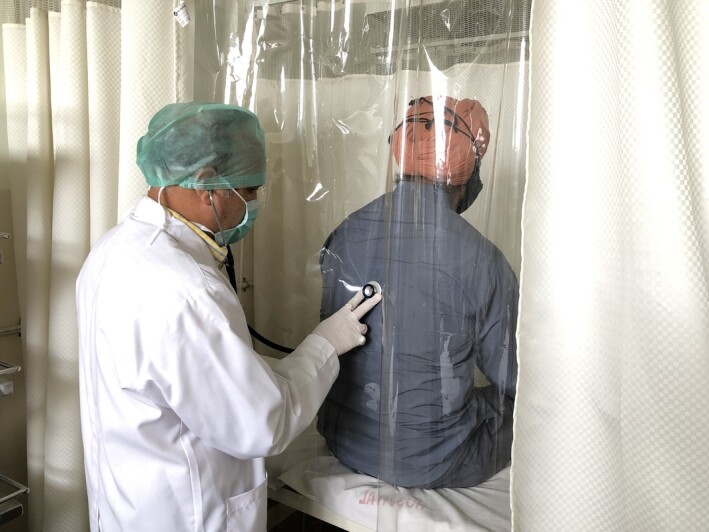The COVID‐19 pandemic has brought day‐to‐day life to a standstill. During such difficult times, the safety of medical staff becomes more important as they are on the frontline in tackling the disease. Despite aggressive safety measures and use of personal protective equipment, infections and deaths have been reported among healthcare professionals (HCPs),1 which has led to concern among the medical community and stigma among the wider public.2 The closed environment of an isolation ward adds to this fear. As the virus is said to have droplet and contact (and possible aerosol) transmission, isolation is the key to safety and control of disease.3, 4
We suggest that, in addition to the usual safety precautions, the possibility of infection transmission to HCPs can be further reduced by using a transparent plastic curtain between the patient and the HCP in isolation wards. They can be used to surround the patient’s bed (partially or completely) either alone or along with the usual opaque privacy curtains. They are inexpensive and easily available. Stable patients in isolation can be examined through this curtain. The transparency of the curtain allows visibility of the patient even from a distance, and it reduces the possibility of droplet transmission as it provides an additional layer of protection. Noninvasive examinations (such as auscultation) can also take place through the curtain (Fig. 1) and the curtain allows for communication between the patient and the doctor. This type of transparent curtain can also be used in other settings such as outpatient departments, pharmacies, dispensaries and shops. Even after the pandemic is over, the cost of healthcare services is expected to rise; therefore, healthcare facilities must find efficient and economic alternatives.
Figure 1.

Auscultation being performed through a transparent curtain.
Contributor Information
S. Gupta, Departments ofDepartment of DermatologyMaharishi Markandeshwar Institute of Medical Sciences and Research (MMDU) Mullana Ambala India
S. Gupta, Department Medicine Maharishi Markandeshwar Institute of Medical Sciences and Research (MMDU) Mullana Ambala India
A.V. Gujrathi, Departments ofDepartment of DermatologyMaharishi Markandeshwar Institute of Medical Sciences and Research (MMDU) Mullana Ambala India
References
- Mueller B. Eight U.K. doctors died from coronavirus. All were immigrants. Available at: https://www.nytimes.com/2020/04/08/world/europe/coronavirus‐doctors‐immigrants.html (accessed 10 April 2020).
- Stone W, Fadel L. 'It's like walking into Chernobyl', one doctor says of her emergency room. Available at: https://www.npr.org/2020/04/09/830143490/it‐s‐like‐walking‐into‐chernobyl‐one‐doctor‐says‐of‐her‐emergency‐room (accessed 10 April 2020).
- Wu YC, Chen CS, Chan YJ. The outbreak of COVID‐19: an overview. J Chin Med Assoc 2020; 83: 217–20. [DOI] [PMC free article] [PubMed] [Google Scholar]
- Wang J, Du G. COVID‐19 may transmit through aerosol. Ir J Med Sci 2020. [Epub ahead of print] [DOI] [PMC free article] [PubMed] [Google Scholar]


